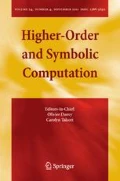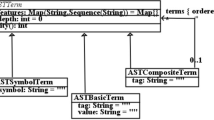Abstract
Staging is a powerful language construct that allows a program at one stage of evaluation to manipulate and specialize a program to be executed at a later stage. We propose a new staged language calculus, 〈ML〉, which extends the programmability of staged languages in two directions. First, 〈ML〉 supports dynamic type specialization: types can be dynamically constructed, abstracted, and passed as arguments, while preserving decidable typechecking via a System F≤-style semantics combined with a restricted form of λ ω -style runtime type construction. With dynamic type specialization the data structure layout of a program can be optimized via staging. Second, 〈ML〉 works in a context where different stages of computation are executed in different process spaces, a property we term staged process separation. Programs at different stages can directly communicate program data in 〈ML〉 via a built-in serialization discipline. The language 〈ML〉 is endowed with a metatheory including type preservation, type safety, and decidability as demonstrated constructively by a sound type checking algorithm. While our language design is general, we are particularly interested in future applications of staging in resource-constrained and embedded systems: these systems have limited space for code and data, as well as limited CPU time, and specializing code for the particular deployment at hand can improve efficiency in all of these dimensions. The combination of dynamic type specialization and staging across processes greatly increases the utility of staged programming in these domains. We illustrate this via wireless sensor network programming examples.

















Similar content being viewed by others
Notes
In this proof and later, when given a judgement obtained as an instance of a particular derivation rule, we may assert validity of the precedents of that derivation rule instance in the standard manner; we refer to this as an inversion of the known derivation rule instance.
In general, a partial function f extends a partial function g iff f(x)=g(x) for all \(x \in\operatorname{Dom}(g)\).
Operative rules label consequents in all reconstructed derivation fragments.
In real-world WSN programs, 1-hop broadcasting does not need to specify a destination address. The example here is used to demonstrate language features, and in the real world, this programming pattern is still useful when polling all neighbors one by one with neighbor-specific requests.
References
Aiken, A., Wimmers, E.L., Lakshman, T.K.: Soft typing with conditional types. In: Conference Record of the Twenty-First Annual ACM Symposium on Principles of Programming Languages, pp. 163–173 (1994)
Barendregt, H.: Introduction to generalized type systems. J. Funct. Program. 1(2), 125–154 (1991)
Bove, A., Dybjer, P., Norell, U.: A brief overview of agda—a functional language with dependent types. In: Berghofer, S., Nipkow, T., Urban, C., Wenzel, M. (eds.) Theorem Proving in Higher Order Logics. Lecture Notes in Computer Science, vol. 5674, pp. 73–78. Springer, Berlin (2009)
Brady, E.: Irdis: a language with dependent types. http://www.idris-lang.org (2009)
Brady, E., Hammond, K.: A verified staged interpreter is a verified compiler. In: GPCE’06: Proceedings of the 5th International Conference on Generative Programming and Component Engineering, pp. 111–120. ACM, New York (2006)
Calcagno, C., Moggi, E., Taha, W.: Closed types as a simple approach to safe imperative multi-stage programming. In: ICALP ’00: Proceedings of the 27th International Colloquium on Automata, Languages and Programming, pp. 25–36. Springer, London (2000)
Cardelli, L.: Program fragments, linking, and modularization. In: Conference Record of POPL’97: The 24th ACM SIGPLAN-SIGACT Symposium on Principles of Programming Languages, pp. 266–277 (1997)
Cardelli, L., Wegner, P.: On understanding types, data abstraction, and polymorphism. ACM Comput. Surv. 17(4), 471–523 (1985)
Chen, C., Xi, H.: Meta-programming through typeful code representation. In: ICFP’03 (2003)
Chen, C., Xi, H.: Combining programming with theorem proving. In: Proceedings of the Tenth ACM SIGPLAN International Conference on Functional Programming, ICFP ’05, pp. 66–77. ACM, New York (2005)
Consel, C., Hornof, L., Marlet, R., Muller, G., Thibault, S., Volanschi, E.-N., Lawall, J., Noyé, J.: Tempo: specializing systems applications and beyond. ACM Comput. Surv., 19 (1998)
Coquand, T., Huet, G.: The calculus of constructions. Inf. Comput. 76(2–3), 95–120 (1988)
Coquand, T., Huet, G., et al.: The Coq proof assistant. http://coq.inria.fr
Crary, K., Weirich, S., Morrisett, G.: Intensional polymorphism in type-erasure semantics. J. Funct. Program. 12(6), 567–600 (2002)
Davies, R., Pfenning, F.: A modal analysis of staged computation. J. ACM 48(3), 555–604 (2001)
Dreyer, D.: A type system for well-founded recursion. In: Proceedings of the 31st ACM SIGPLAN-SIGACT Symposium on Principles of Programming Languages, POPL ’04, pp. 293–305 (2004)
Eifrig, J., Smith, S., Trifonov, V.: Type inference for recursively constrained types and its application to OOP. In: Mathematical Foundations of Programming Language Semantics (MFPS). Electronic Lecture Notes in Computer Science, vol. 1 (1995)
Flatt, M., Felleisen, M.: Units: cool modules for HOT languages. In: Proceedings of the ACM SIGPLAN ’98 Conference on Programming Language Design and Implementation, pp. 236–248 (1998)
Fogarty, S., Pasalic, E., Siek, J., Taha, W.: Concoqtion: indexed types now! In: Proceedings of the 2007 ACM SIGPLAN Symposium on Partial Evaluation and Semantics-Based Program Manipulation, PEPM ’07, pp. 112–121. ACM, New York (2007)
Ganz, S.E., Sabry, A., Taha, W.: Macros as multi-stage computations: type-safe, generative, binding macros in MacroML. In: ICFP’01: Proceedings of the Sixth ACM SIGPLAN International Conference on Functional Programming, pp. 74–85. ACM, New York (2001)
Gay, D., Levis, P., von Behren, R., Welsh, M., Brewer, E., Culler, D.: The nesC language: a holistic approach to networked embedded systems. In: PLDI’03: Proceedings of the ACM SIGPLAN 2003 Conference on Programming Language Design and Implementation, pp. 1–11. ACM, New York (2003)
Ghelli, G., Pierce, B.: Bounded existentials and minimal typing. Theor. Comput. Sci. 193(1–2), 75–96 (1998)
Gillenwater, J., Malecha, G., Salama, C., Zhu, A.Y., Taha, W., Grundy, J., O’Leary, J.: Synthesizable high level hardware descriptions: using statically typed two-level languages to guarantee verilog synthesizability. In: Proceedings of the 2008 ACM SIGPLAN Symposium on Partial Evaluation and Semantics-Based Program Manipulation, PEPM ’08, pp. 41–50. ACM, New York (2008)
Harper, R., Mitchell, J.C., Moggi, E.: Higher-order modules and the phase distinction. In: Seventeenth ACM Symposium on Principles of Programming Languages, pp. 341–354. ACM Press, New York (1990)
Harper, R., Morrisett, G.: Compiling polymorphism using intensional type analysis. In: Twenty-Second ACM Symposium on Principles of Programming Languages, pp. 130–141. ACM Press, New York (1995)
Hill, J., Szewczyk, R., Woo, A., Hollar, S., Culler, D.E., Pister, K.S.J.: System architecture directions for networked sensors. In: Architectural Support for Programming Languages and Operating Systems, pp. 93–104 (2000)
Honsell, F., Mason, I.A., Smith, S., Talcott, C.: A variable typed logic of effects. Inf. Comput. 119, 55–90 (1993)
Kameyama, Y., Kiselyov, O., Shan, C.-c.: Shifting the stage: staging with delimited control. In: PEPM’09: Proceedings of the 2009 ACM SIGPLAN Workshop on Partial Evaluation and Program Manipulation, pp. 111–120. ACM, New York (2009)
Kiselyov, O., Swadi, K.N., Taha, W.: A methodology for generating verified combinatorial circuits. In: Proceedings of the 4th ACM International Conference on Embedded Software, EMSOFT ’04, pp. 249–258. ACM, New York (2004)
Krishnamurthi, S., Felleisen, M., Duba, B.F.: From macros to reusable generative programming. In: International Symposium on Generative and Component-Based Software Engineering. Lecture Notes in Computer Science, vol. 1799, pp. 105–120. Springer, Berlin (1999)
Leroy, X.: Applicative functors and fully transparent higher-order modules. In: POPL, pp. 142–153 (1995)
Leroy, X.: A modular module system. J. Funct. Program. 10(3), 269–303 (2000)
Liu, Y.D., Skalka, C., Smith, S.: Type-specialized staged programming with process separation. In: Workshop on Generic Programming (WGP 09), Edinburgh, Scotland (2009)
MacQueen, D.: Modules for standard ML. In: Proceedings of ACM Conference on Lisp and Functional Programming, pp. 409–423 (1984)
Madden, S., Franklin, M.J., Hellerstein, J.M., Hong, W.: TAG: a Tiny AGgregation service for ad-hoc sensor networks. SIGOPS Oper. Syst. Rev. 36(SI), 131–146 (2002)
Mainland, G., Morrisett, G., Welsh, M.: Flask: staged functional programming for sensor networks. In: 13th ACM SIGPLAN International Conference on Functional Programming (ICFP 2008), September (2008)
Martin-Löf, P.: An intuitionistic theory of types: predicative part. In: Rose, H.F., Shepherdson, J.C. (eds.) Logic Colloquium ’73, pp. 73–118. North-Holland, Amsterdam (1973)
Moggi, E., Fagorzi, S.: A monadic multi-stage metalanguage. In: Gordon, A.D. (ed.) FoSSaCS. Lecture Notes in Computer Science, vol. 2620, pp. 358–374. Springer, Berlin (2003)
Moggi, E., Taha, W., El abidine Benaissa, Z., Sheard, T.: An idealized MetaML: simpler, and more expressive. In: European Symposium on Programming (ESOP), pp. 193–207. Springer, Berlin (1999)
Monnier, S., Shao, Z.: Inlining as staged computation. J. Funct. Program. 13(3), 647–676 (2003)
Murphy VII, T., Crary, K., Harper, R., Pfenning, F.: A symmetric modal lambda calculus for distributed computing. In: LICS ’04: Proceedings of the 19th Annual IEEE Symposium on Logic in Computer Science, pp. 286–295. IEEE Computer Society, Washington (2004)
Nanevski, A.: Meta-programming with names and necessity. In: ICFP’02: Proceedings of the Seventh ACM SIGPLAN International Conference on Functional Programming pp. 206–217. ACM, New York (2002)
Nanevski, A., Morrisett, G., Shinnar, A., Govereau, P., Birkedal, L.: Ynot: dependent types for imperative programs. In: ICFP ’08: Proceedings of the 13th ACM SIGPLAN International Conference on Functional Programming (2008)
Newton, R., Morrisett, G., Welsh, M.: The regiment macroprogramming system. In: IPSN’07: Proceedings of the 6th International Conference on Information Processing in Sensor Networks, pp. 489–498 (2007)
Pasalic, E., Taha, W., Sheard, T., Tim, S.: Tagless staged interpreters for typed languages. In: The International Conference on Functional Programming (ICFP’02), pp. 218–229. ACM, New York (2002)
Pottier, F.: A versatile constraint-based type inference system. Nord. J. Comput. 7(4), 312–347 (2000)
Salama, C., Malecha, G., Taha, W., Grundy, J., O’Leary, J.: Static consistency checking for verilog wire interconnects: using dependent types to check the sanity of verilog descriptions. In: Proceedings of the 2009 ACM SIGPLAN Workshop on Partial Evaluation and Program Manipulation, PEPM’09, pp. 121–130. ACM, New York (2009)
Schurgers, C., Kulkarni, G., Srivastava, M.B.: Distributed on-demand address assignment in wireless sensor networks. IEEE Trans. Parallel Distrib. Syst. 13(10), 1056–1065 (2002)
Shi, R., Chen, C., Xi, H.: Distributed meta-programming. In: GPCE’06: Proceedings of the 5th International Conference on Generative Programming and Component Engineering, pp. 243–248 (2006)
Taha, W.: A gentle introduction to multi-stage programming. In: Lengauer, C., Batory, D., Consel, C., Odersky, M. (eds.) Domain-Specific Program Generation. Lecture Notes in Computer Science, vol. 3016, pp. 30–50. Springer, Berlin (2004). doi:10.1007/978-3-540-25935-03
Taha, W.: Resource-aware programming. In: Wu, Z., Chen, C., Guo, M., Bu, J. (eds.) ICESS. Lecture Notes in Computer Science, vol. 3605, pp. 38–43. Springer, Berlin (2004)
Taha, W., El-abidine Benaissa, Z., Sheard, T.: Multi-stage programming: axiomatization and type safety (extended abstract). In: 25th International Colloquium on Automata, Languages, and Programming, pp. 918–929. Springer, Berlin (1998)
Taha, W., Ellner, S., Xi, H.: Generating heap-bounded programs in a functional setting. In: EMSOFT, pp. 340–355. Springer, Berlin (2003)
Taha, W., et al.: MetaOCaml: a compiled, type-safe multi-stage programming language. http://www.metaocaml.org/
Taha, W., Nielsen, M.F.: Environment classifiers. In: POPL’03 (2003)
Taha, W., Sheard, T.: Multi-stage programming with explicit annotations. In: PEPM ’97: Proceedings of the 1997 ACM SIGPLAN Symposium on Partial Evaluation and Semantics-Based Program Manipulation, pp. 203–217 (1997)
Wan, Z., Hudak, P.: Functional reactive programming from first principles. In: PLDI ’00: Proceedings of the ACM SIGPLAN 2000 Conference on Programming Language Design and Implementation, pp. 242–252. ACM, New York (2000)
Xi, H., Chen, C., Chen, G.: Guarded recursive datatype constructors. In: POPL’03: Proceedings of the 30th ACM SIGPLAN-SIGACT Symposium on Principles of Programming Languages, pp. 224–235. ACM, New York (2003)
Xi, H., Pfenning, F.: Dependent types in practical programming. In: Proceedings of the 26th ACM SIGPLAN-SIGACT Symposium on Principles of Programming Languages, POPL’99, pp. 214–227. ACM, New York (1999)
Acknowledgements
The authors thank Anindya Banerjee and several anonymous reviewers for their significantly helpful input on drafts of this paper.
Author information
Authors and Affiliations
Corresponding author
Additional information
Christian Skalka’s work was supported by a grant from the Air Force Office of Scientific Research Young Investigator Program (AFOSR YIP).
Rights and permissions
About this article
Cite this article
Liu, Y.D., Skalka, C. & Smith, S.F. Type-specialized staged programming with process separation. Higher-Order Symb Comput 24, 341–385 (2011). https://doi.org/10.1007/s10990-012-9089-0
Published:
Issue Date:
DOI: https://doi.org/10.1007/s10990-012-9089-0




